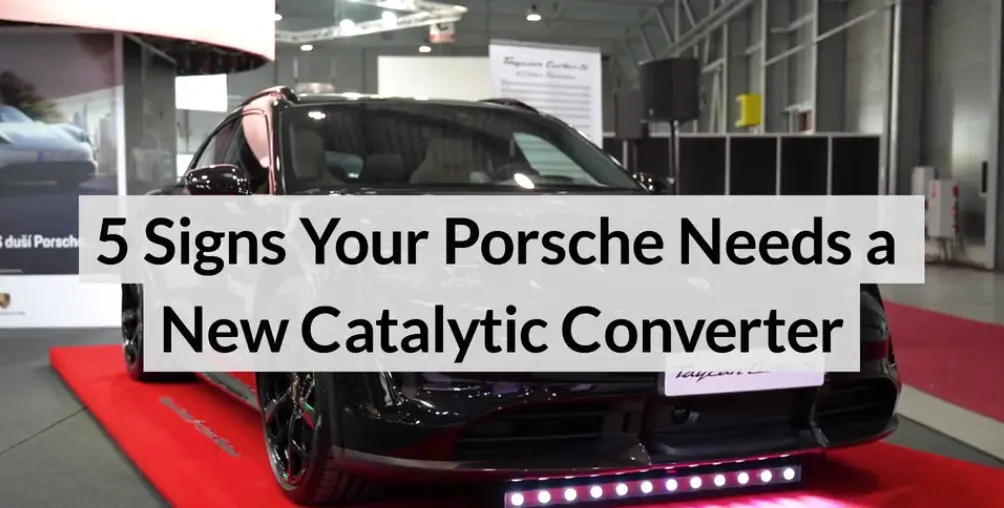When you drive a Porsche, you’re not just enjoying a high-performance machine but taking responsibility for a finely tuned engineering masterpiece. Everything from the tires to the exhaust system affects how your car performs.
One component you might overlook until there’s a problem is the catalytic converter, but it’s one of the most essential parts for performance and environmental compliance. Knowing when your Porsche needs a new catalytic converter keeps your driving experience as smooth and powerful as it should be.
The catalytic converter isn’t just another part buried in your exhaust system. It’s responsible for converting harmful pollutants into less toxic emissions. If it begins to fail, your car will not only struggle to pass emissions testing but may also suffer from decreased performance, fuel efficiency issues, and even engine damage. This is why spotting the signs early can save you money and hassle and protect the integrity of your vehicle.
Why the Catalytic Converter Matters So Much in a Porsche
Porsche engineered your vehicle with precision. That includes the balance of air-fuel ratios, combustion, and exhaust flow. The catalytic converter helps to regulate this system. It ensures that your car meets emissions standards while still allowing the engine to breathe and perform at its peak. When the catalytic converter becomes clogged, cracked, or worn out due to age or contamination, you’ll feel it in more ways than one.
If you’ve ever pushed your car on a twisty road or opened it up on the highway, you know that lag or hesitation is a warning sign. A failing catalytic converter can create back pressure that throws off your engine’s tuning. This leads to a drop in horsepower, rough idling, or even stalling. You might not think a single part could cause so many issues, but in a precision-tuned Porsche, small changes ripple through the whole system.
Sign #1: The Check Engine Indicator Doesn’t Lie
The infamous check engine light is one of the first signs that something might be wrong with your catalytic converter. It’s easy to ignore, especially if your car seems to be running fine. But if you’re driving a Porsche and this light comes on, it’s time to take it seriously. The onboard diagnostic system monitors sensors that detect inefficiencies in the catalytic converter’s performance.
You may receive a specific code related to the oxygen sensors or catalytic converter efficiency. These codes don’t automatically mean you need to replace the part. It could be a sensor malfunction or something simpler. But they should prompt you to schedule a proper diagnostic. Ignoring these early warnings can lead to more serious problems, including engine misfires and permanent damage to the exhaust system.
Sign #2: Decreased Performance and Acceleration Issues
If your Porsche suddenly feels sluggish, you might blame the fuel, the weather, or even your driving mood. But what you could actually be feeling is a clogged catalytic converter restricting the exhaust flow. This limits your engine’s efficiency, especially under load or acceleration.
Let’s say you’re accelerating onto the freeway and your car hesitates or seems to lose power. You know something’s off. In a high-performance car like a 911 or Panamera, hesitation shouldn’t happen unless something restricts airflow. And more often than not, the catalytic converter is the bottleneck.
You’ll also notice reduced throttle response and a general lack of the crisp, responsive feel you expect from a Porsche. These symptoms creep up slowly at first, which makes them easy to miss until performance drops noticeably. By that point, the converter may already be too far gone to be cleaned or repaired.
Sign #3: Rattling Noises and Strong Odors
Unusual sounds or smells are another red flag. If you hear a rattling sound underneath your vehicle, especially when starting it cold or accelerating, it could mean the internal components of your catalytic converter are breaking apart. The ceramic honeycomb structure inside the converter can become brittle over time or suffer damage from misfires and overheating.
That rattle might seem minor at first, but it can lead to particles breaking off and blocking the exhaust flow. Eventually, the restriction becomes severe enough to affect drivability, or in some cases, even prevent your car from starting.
You might also detect a rotten egg odor, especially during acceleration or after the engine warms up. That smell comes from hydrogen sulfide, which isn’t being properly converted into harmless gases. When the converter fails to do its job, it’s not only polluting more but potentially causing internal engine stress due to poor combustion.
Sign #4: Fuel Efficiency Drops and Overheating
Another sign your Porsche may need a new catalytic converter is a noticeable drop in fuel efficiency. If you find yourself filling up more often without any change in your driving habits, it could be a clue that your exhaust system isn’t working properly. A faulty catalytic converter can cause the engine to work harder, leading to inefficient fuel use.
In some models, especially older or high-mileage Porsches, a damaged converter can cause the engine to run hotter than usual. This is uncomfortable as well as dangerous. Excessive heat can damage sensitive components under the hood and put your engine at risk of serious harm. If the underbody or engine bay feels excessively hot after normal driving, it’s worth checking your catalytic converter as part of your inspection.
Sign #5: Visual Inspection and Professional Diagnostics
While you can’t see inside your catalytic converter, there are ways to inspect it. If you get your car up on a lift, you might notice discoloration, cracking, or even melted sections of the exhaust system near the converter. These are clear signs of overheating or internal failure.
That said, a visual inspection can only tell you so much. The real diagnostic power comes from a professional scan tool, which can read real-time data from your oxygen sensors, monitor exhaust temperatures, and track performance changes over time. If you’re seeing warning lights, hearing odd noises, or feeling power loss, search “Porsche auto repair near me.” There, you can find a technician who can pinpoint whether your converter is the problem or if something else is causing similar symptoms.
Let’s say you bring your Porsche Cayman to a reputable specialist. They hook up a scan tool, check the O2 sensor readings, and spot that the post-converter sensor reads similarly to the pre-converter one. That means the converter isn’t doing its job, and it’s time for a replacement.
When to Replace vs. Repair
The truth is, catalytic converters aren’t cheap, especially not for a Porsche. But waiting too long only adds to the cost. You may wonder whether it’s possible to clean or repair a failing converter instead of replacing it. In some cases, chemical cleaners or driving at higher RPMs can temporarily improve converter performance, especially if the issue is mild carbon buildup.
However, these solutions are stopgaps at best. Once the core material inside the converter has broken down, the only real fix is replacement. If you catch the problem early, you can avoid damaging surrounding components or failing a smog test. In some regions, driving with a faulty catalytic converter could even get you fined.
If you own a high-mileage Porsche, especially from the 1990s or early 2000s, it’s worth getting your catalytic converter inspected during routine service intervals. It’s better to replace it proactively than to be caught off guard when your car starts sputtering or fails inspection.
Stay Up-to-Date with Maintenance
Your Porsche deserves care that matches its pedigree. The catalytic converter might not be glamorous, but it’s one of the most important parts of your car’s overall health. By recognizing the signs of failure early, whether it’s sluggish performance, odd smells, rattling sounds, or dashboard warnings, you can avoid expensive repairs and keep your car running the way Porsche meant it to.
Don’t let one small component compromise your driving experience. If you suspect your catalytic converter might be past its prime, schedule routine maintenance for luxury car compliance in Salt Lake City or nearby and take the guesswork out of the equation. Your Porsche (and your peace of mind) will thank you.
Video
Infographic
A finely tuned machine like your Porsche depends on every component working in harmony—especially the catalytic converter. If it becomes clogged, cracked, or worn out, performance may decline. Check out this infographic for signs that your Porsche might need a new catalytic converter.



